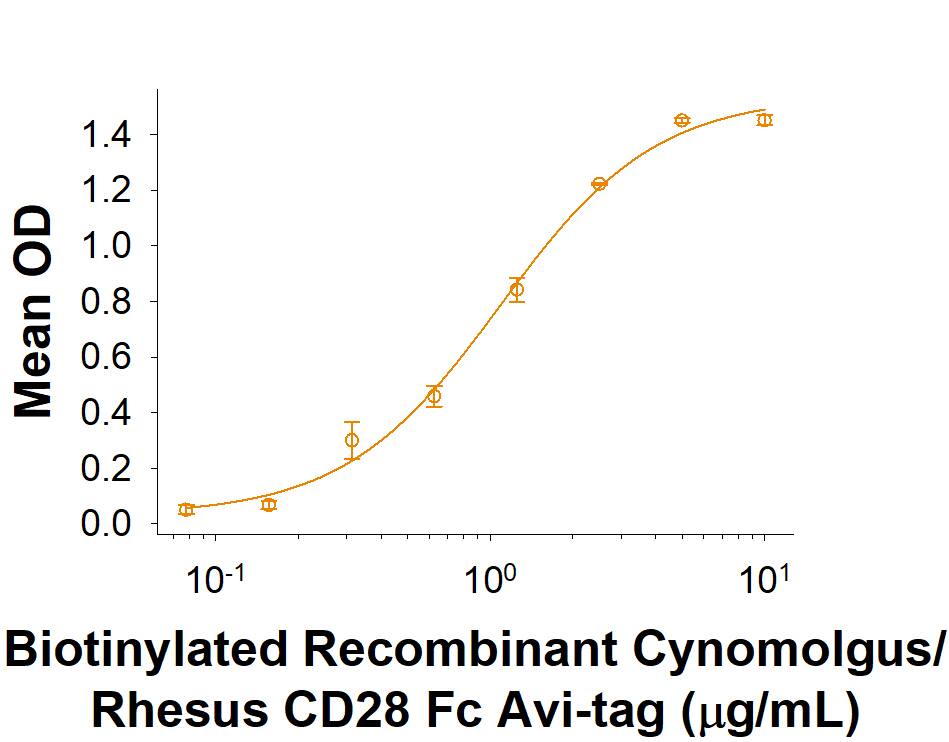Recombinant Human/Cynomolgus/Rhesus CD28 Fc Avi-tag, CF
R&D Systems, part of Bio-Techne | Catalog # AVI342

Key Product Details
Source
Accession #
Structure / Form
Conjugate
Applications
Product Specifications
Source
| Human/Cynomolgus Monkey/Rhesus Macaque CD28 (Asn19-Pro152) Accession # P10747.1 |
DMD | Human IgG1 (Pro100-Lys330) |
Avi-tag |
| N-terminus | C-terminus | ||
Purity
Endotoxin Level
N-terminal Sequence Analysis
Predicted Molecular Mass
SDS-PAGE
Activity
When Recombinant Human B7-1/CD80 Fc Chimera Protein (Catalog # 10133-B1) is immobilized at 10 µg/mL (100 µL/well), the concentration of Biotinylated Recombinant Cynomolgus Monkey/Rhesus Macaque CD28 Fc Chimera Avi-tag that produces a 50% optimal binding response is found to be 0.5-3 µg/mL.
Scientific Data Images for Recombinant Human/Cynomolgus/Rhesus CD28 Fc Avi-tag, CF
Recombinant Human/Cynomolgus/Rhesus CD28 Fc Avi-tag Binding Activity
When Recombinant Human B7-1/CD80 Fc Chimera Protein (Catalog # 10133-B1) is immobilized at 10 µg/mL (100 µL/well), the concentration of Biotinylated Recombinant Cynomolgus Monkey/Rhesus Macaque CD28 Fc Chimera Avi-tag that produces a 50% optimal binding response is found to be 0.5-3 µg/mL.Formulation, Preparation and Storage
AVI342
| Formulation | Supplied as a 0.2 μm filtered solution in PBS. |
| Shipping | The product is shipped with dry ice or equivalent. Upon receipt, store it immediately at the temperature recommended below. |
| Stability & Storage | Use a manual defrost freezer and avoid repeated freeze-thaw cycles. |
Background: CD28
CD28 is the founding member of a subfamily of structurally homologous costimulatory or immune checkpoint molecules of the immunoglobulin (Ig) superfamily. The CD28/B7 pathway has been shown to play a central role in immune responses against infection, autoimmune diseases, and graft rejection (1). CD28 subfamily members, including ICOS, CTLA4, PD1, PD1H, and BTLA, are characterized by a single Ig V-like extracellular domain (ECD), a transmembrane domain and an intracellular domain with highly conserved tyrosine-based signaling motifs (2). CD28 and ICOS predominately enhance T-cell activation, while CTLA-4, PD-1 and BTLA are inhibitory (1-3). The mature ECD of human CD28 shares 65% and 66% amino acid sequence identity with mouse and rat CD28, respectively. CD28 and CTLA-4, together with their ligands, B7-1 and B7-2, constitute one of the dominant co-stimulatory pathways that regulate T and B cell responses. CD28 is expressed on approximately 80% of CD4+ T cells and 50% of CD8+ T cells in humans, with the proportion of CD28-positive T cells declining with age (1-4). CD28 expression has been identified on other cell lineages, including bone marrow stromal cells, plasma cells, neutrophils, and eosinophils (5). CD28 is expressed on the cell surface as a disulfide-linked homodimer and the covalent bond is required for maximum activity (6,7). Although both CTLA-4 and CD28 can bind to the same ligands, CTLA-4 binds to B7-1 and B7-2 with a 20-100 fold higher affinity than CD28. While, CD28 ligation is critical in promoting proliferation and effector function of conventional T cells, it also promotes the anti-inflammatory function of Treg cells. Thus, CD28 serves both pro- and anti-inflammatory roles depending on the cell type and context in which it is expressed (8). The CD28 pathway has effects both at amplifying signals initiated by the T cell receptor and on a variety of processes, including signaling, metabolism, transcription, epigenetic modifications, post-translational modifications, and RNA splicing (9).Our Avi-tag Biotinylated CD28 features biotinylation at a single site contained within the Avi-tag, a unique 15 amino acid peptide. Protein orientation will be uniform when bound to streptavidin-coated surface due to the precise control of biotinylation and the rest of the protein is unchanged so there is no interference in the protein's bioactivity.
References
- Sandigursky, S. et al. (2020). Clin Immunol. 217:108485l.
- Chen, L. and Flies D.B. (2013) Nat Rev Immunol. 13:227.
- Esensten, J.H. et al. (2016) Immunity. 44:973.
- Jonathan, H. et al. (2016) Immunity. 44:937.
- Boomer, J.S. and Green, J.M. (2010) Cold Spring Harb Perspect Biol 2:a002436.
- Greene, J.L. et al. (1996) J Biol Chem. 271:26762.
- Lazar-Molnar, E. et al. (2006) Cell Immunol. 244:125.
- He, X. et al. (2017) Scientific Reports. 7:43003.
- West, S.M. et al. (2019) Exp Biol. Med. (Maywood) 244:1577.
Alternate Names
Gene Symbol
UniProt
Additional CD28 Products
Product Documents for Recombinant Human/Cynomolgus/Rhesus CD28 Fc Avi-tag, CF
Product Specific Notices for Recombinant Human/Cynomolgus/Rhesus CD28 Fc Avi-tag, CF
For research use only
